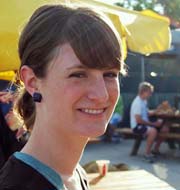
Valentine Meeting Reflection by Michael Varien and the Water Quality Team
A few weeks ago, I found myself in a van with my team members, KC McFerson, Alex Page, Casey Weisinger, project manager Rebecca Harbage, and adviser Bob Parker, traveling through the Oregon countryside on our way to Gold Hill. Through collaboration with the city over the next few months, our team will develop strategies and recommendations to help the city better address water quality issues in the Rogue River. Our final work products will include recommendations for incorporating low impact development (LID) into city code, a draft riparian vegetation management ordinance, and a strategic action plan detailing outreach and engagement strategies the city will use to address water quality issues within its jurisdiction. Our team was formed in early January and after several weeks of getting up to speed with the subject matter, we were finally ready for our first steering committee meeting… which took place on February 15th, the day after Valentine’s Day. Our anticipation leading up to this meeting was not unlike the uncertainty of Valentine’s Day, reminders of which appeared throughout the day.
As Rebecca Harbage wrote in a previous post, this project was our valentine. Two things happened over the course of the day to remind us of this. Our team met on campus in the early morning to carpool to Gold Hill (2.5 hours south of Eugene). As we waited outside of our minivan, we noticed a manila envelope on the ground. Inside was a lost and found valentine addressed to whoever was lucky enough to find the envelope. We then proceeded to the City of Rogue River for lunch at a small café where they were still set up for Valentine’s Day with reds and pinks and white linen. It was all quite charming and a bit out of place for our group’s agenda. However, it did seem to play out that our project was indeed our valentine and, like many first Valentine’s Day dates, we couldn’t be sure what to expect.
This meeting was the first of a series of stakeholder meetings our team will facilitate in Gold Hill. While most of us have participated in meetings through school, internships, or work, we rarely have the opportunity to interact directly with local government and residents to find ways of addressing issues affecting the community as a whole. Some of our goals for the meeting were to establish a common understanding of water quality, communicate our team’s role in the process, and create an environment suited for collaboration. The biggest unknowns going into this meeting were local understanding of water quality issues and the level of enthusiasm we could expect from the steering committee. Water quality issues are initially difficult to understand and harder still to evaluate. For example, how should a city address the pollution from fertilizers, car oil, and other substances that washes off of pavement and lawns on both public and private property during rain storms? However, action has to start somewhere and that is exactly what is happening the steering committee is doing in Gold Hill.
Our first public meeting went very well. Several city staff, council members, and residents convened around a long table at City Hall. We were initially worried about how to stay on track and cover all of the very complicated material in the allotted time, but the meeting ran smoothly. Rebecca introduced the project purpose and facilitated the process very well. A representative of the EPA Department of Environmental Quality presented the technical components of water quality in the Rogue Basin, followed by our team’s presentation on our role and project elements. We rounded out the meeting with a brainstorming session that really let the committee members’ creativity shine. Ideas flew across the room, including demonstration sites, free saplings and shrubs, and even improving salmon habitat.
We were fortunate to have found both a valentine and a receptive a steering committee on this day. We will take what we learned at this meeting, integrate it with available resources for addressing water quality, and incorporate the insight and recommendations of the steering committee in our future work. At our next meeting we hope to present some options and recommendations for low impact development and community outreach. From my perspective, our first meeting was a success. We initiated a working relationship with the committee, established a common understanding about our role and the project process, and gained valuable recommendations from the committee to help guide this project forward. Not a bad first Valentine’s date!
More about the Community Planning Workshop(CPW)
